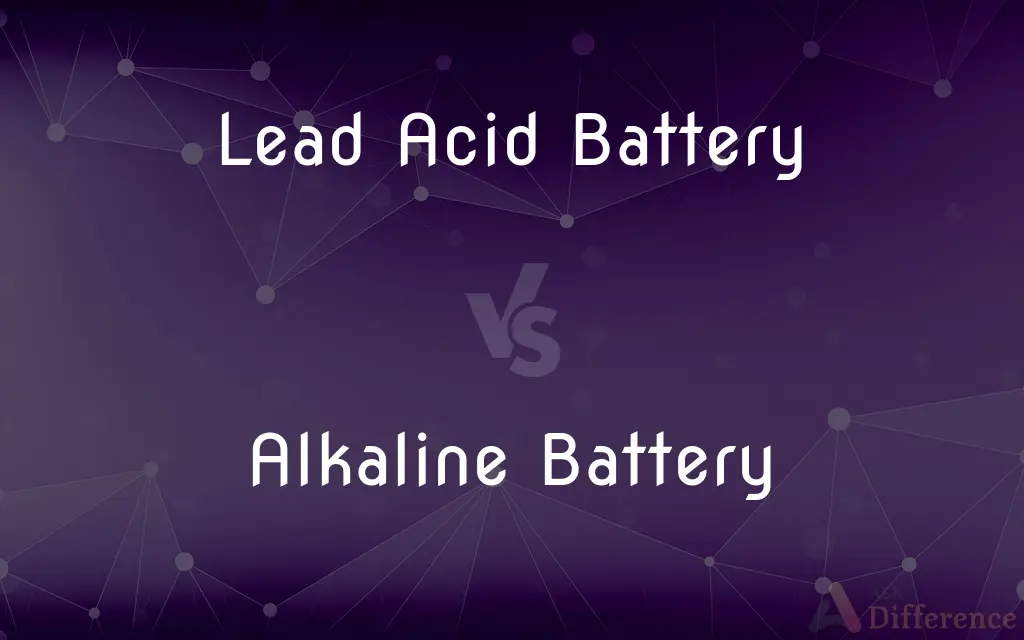Lead Acid Battery vs. Alkaline Battery — What's the Difference?
By Tayyaba Rehman — Published on November 13, 2023
A Lead Acid Battery is a rechargeable battery using lead dioxide and sponge lead in an acid solution. An Alkaline Battery is a non-rechargeable battery using an alkaline electrolyte, typically potassium hydroxide.

Difference Between Lead Acid Battery and Alkaline Battery
Table of Contents
ADVERTISEMENT
Key Differences
The Lead Acid Battery is one of the oldest types of rechargeable batteries. The Alkaline Battery, while older in conception, gained massive popularity due to its long shelf life and affordability.
Compositionally, a Lead Acid Battery utilizes lead dioxide as its positive plate, sponge lead as its negative plate, and a dilute sulfuric acid solution as its electrolyte. On the other hand, the Alkaline Battery uses zinc and manganese dioxide as the electrodes and an alkaline electrolyte, usually potassium hydroxide.
When considering applications, the Lead Acid Battery is commonly found in automotive starters and backup power sources. Conversely, Alkaline Batteries are more prevalent in household devices, like remote controls and flashlights.
The Lead Acid Battery, due to its rechargeability, has a cycle of discharging and charging. In contrast, once an Alkaline Battery is depleted, it is typically discarded, making it a primary battery.
In terms of environmental considerations, Lead Acid Batteries contain toxic lead and acid, requiring careful disposal. Alkaline Batteries, while less harmful, still necessitate proper disposal due to potential leakage of alkaline material.
ADVERTISEMENT
Comparison Chart
Rechargeability
Rechargeable
Non-rechargeable
Primary Components
Lead, Lead dioxide, Sulfuric acid
Zinc, Manganese dioxide, Potassium hydroxide
Typical Applications
Cars, Backup power
Household electronics
Lifecycle
Multiple charge/discharge cycles
Single-use
Environmental Concerns
Toxic lead and acid
Possible alkaline leakage
Compare with Definitions
Lead Acid Battery
The traditional choice for vehicles' ignition and lighting.
Make sure the Lead Acid Battery in the car is fully charged before a long trip.
Alkaline Battery
A primary battery featuring an alkaline electrolyte.
The TV remote requires a new Alkaline Battery.
Lead Acid Battery
A cell that converts stored chemical energy into electrical energy.
Regular maintenance prolongs the lifespan of a Lead Acid Battery.
Alkaline Battery
A popular choice for household electronic devices.
Make sure to recycle the Alkaline Battery properly after use.
Lead Acid Battery
A battery composed of lead plates immersed in sulfuric acid.
The Lead Acid Battery can be heavy due to its lead content.
Alkaline Battery
A non-rechargeable battery with long shelf life.
I stock up on Alkaline Batteries for emergencies.
Lead Acid Battery
An electrochemical cell capable of being recharged.
The Lead Acid Battery in the UPS provides backup during power cuts.
Alkaline Battery
Known for its better performance compared to zinc-carbon cells.
For high-drain devices, an Alkaline Battery is recommended.
Lead Acid Battery
A battery using lead electrodes and sulfuric acid electrolyte.
The car uses a Lead Acid Battery for starting.
Alkaline Battery
Battery that utilizes zinc and manganese dioxide as electrodes.
This toy operates with an AA Alkaline Battery.
Common Curiosities
What is the primary use of a Lead Acid Battery?
They are commonly used in cars and for backup power systems.
Can an Alkaline Battery be recharged?
Typically, they are non-rechargeable and meant for single-use.
Why do many household devices use Alkaline Batteries?
They offer a long shelf life and are cost-effective.
Is the Lead Acid Battery environmentally friendly?
Due to its lead and acid content, it requires careful disposal.
What is the main disadvantage of a Lead Acid Battery?
It's relatively heavy due to its lead content.
How long does a Lead Acid Battery last?
With proper maintenance, they can last 3-5 years or more.
Are Alkaline Batteries safe for disposal in regular trash?
Ideally, they should be recycled at proper facilities.
Can a Lead Acid Battery leak like an Alkaline one?
Yes, if damaged or improperly maintained, it can leak acid.
Which battery type is more affordable for household use?
Alkaline Batteries are usually more affordable for household electronics.
Is there a weight difference between the two batteries?
Yes, Lead Acid Batteries are generally much heavier than Alkaline Batteries.
Is the output voltage the same for both battery types?
No, they have different voltage outputs depending on their design.
How does the performance of an Alkaline Battery compare to other types?
It typically offers better performance than zinc-carbon cells.
What causes an Alkaline Battery to leak?
Over time, the chemicals can break down and release gas, causing leakage.
Are there safety concerns associated with Lead Acid Batteries?
Yes, they contain sulfuric acid, which is corrosive and can be hazardous if leaked.
Which battery type has a longer operational lifespan?
Lead Acid Batteries can be recharged and used multiple times, while Alkaline Batteries are typically single-use.
Share Your Discovery

Previous Comparison
Double Salt vs. Complex Salt
Next Comparison
Tetanus vs. RabiesAuthor Spotlight
Written by
Tayyaba RehmanTayyaba Rehman is a distinguished writer, currently serving as a primary contributor to askdifference.com. As a researcher in semantics and etymology, Tayyaba's passion for the complexity of languages and their distinctions has found a perfect home on the platform. Tayyaba delves into the intricacies of language, distinguishing between commonly confused words and phrases, thereby providing clarity for readers worldwide.
















































